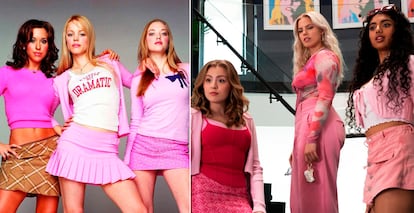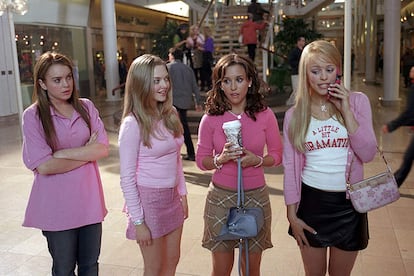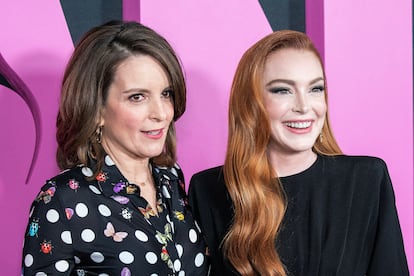‘Mean Girls,’ 20 years later: The villain’s triumph
The original film debuted in 2004, becoming a touchstone for several generations of women who grew up during the 1990s and aughts. Now, it’s ironing out the jokes that aged poorly


The original Mean Girls is an iconic film for millions of people around the world. It debuted in 2004 and became a touchstone for many women who grew up during the 1990s and aughts. It has its own international holiday — October 3 — and anyone who considers themselves a fan knows that on Wednesday, we wear pink. Its followers recently received a gift, which arrives not without its share of barbs: a remake of the film, which has already grossed over $92 million worldwide. Of course, it has had to navigate the many cultural changes that have taken place over the last decade.
Just two decades later, directors Samantha Jayne and Arturo Pérez Jr. have given the film a facelift and once again, brought it to the public. Theirs is a titanic responsibility, given that the original movie inspired a Broadway musical and that the new version, a musical, had to be up to the standards of both, without forgetting the sky-high expectations of fans.

Villains become the heroines
The role of the female villain has been redefined over the past 20 years. In the original Mean Girls, Lindsay Lohan played Cady Heron, your standard teen movie heroine: shy, a newcomer to her high school, naïve, malleable and possessing strong moral values, when the film begins, at least. Rachel McAdams played Regina George, your standard teen movie villain: selfish and self-centered. But in 2024, the protagonist of the movie poster is no longer the good girl. It’s Regina George, now played by Reneé Rapp. She’s the star of the show. Nowadays, the audience wants to be like the bad girl.
A similar phenomenon has taken place with other female characters from this generation of classics, like High School Musical. That film’s fans now deify Sharpay Evans (Ashley Tisdale), a pretentious character with big aspirations that was once perceived as nefarious. The same is true of Gossip Girl’s antagonist, Blair Waldorf (Leighton Meester), who over the years has become the series’ true icon. In large part, the trend can be credited to the empowerment of women that has taken place during the last two decades. A woman having a strong character and ambitions is increasingly seen as something positive, something hers and not as something unpleasant.

“I think it comes from our fascination with female power that us girls have as teenagers. Regina is bad but cunning, she has manipulative power and moments in which she’s so arrogant that she doesn’t see her flaws, she has no real redemption arc,” says Marzol. “It also,” she continues, “has to do with Reneé Rapp, who plays Regina onscreen and has played her in the musical for years, her career is really taking off. It’s much easier to market her character as opposed to any other actor.”
Remake smooths out most offensive jokes
In the new film, the cafeteria’s urban tribes are no longer segregated by ethnicity, and the school’s athletic trainer no longer has a sexual relationship with underage girls. Tina Fey, who wrote the film’s original script, has once again taken the reins to make sure the story doesn’t change significantly, but she has made some tweaks when it comes to the film’s humor. Some jokes from the 2004 installment would not be considered appropriate today, and they’ve been toned down or omitted, even when they were a standout line from the original film. Racist jokes and clichés, such as the “nerdy Chinese” gag and Amanda Seyfried’s famous line (it was the actress’s debut film) “But if you’re from Africa, why are you white?” have been deleted, and many of George’s hostile exclamations about people’s weight have been subtly toned down.

But the remake does preserve that hilarious acidity that characterized the first film, and introduces new jokes that have to do, for example, with social media. The burn book line roasting the homosexual character Damian who is “too gay to function” has stuck around, but this is a script that is much more respectful than the previous version when it comes to the sexual orientation of its characters. Also making their return are lines that critique the educational system and the dearth of inclusive sex ed in high schools. Indeed, when it comes to these topics, the new film’s claws are out. “Don’t have sex, because you will get pregnant and die,” says Coach Carr during health class in the 2004. 20 years later, that’s become mentions of girls having mental health issues due to “a thing called hormones.”
Marzol explains that, more than a straight-up remake of the original film, Samantha Jayne and Arturo Pérez Jr. have made a film adaptation of the Broadway musical. “This musical has had years to iron out all the rough edges and more problematic parts,” she explains. “I think it’s possible to keep those jokes and make new ones while keeping that punk essence, and there are signs that it works.” Marzol highlights the example of Edgar Wright’s remake of Scott Pilgrim vs. The World, which recently premiered on Netflix. “They haven’t erased the problematic parts, but rather recognized them, included them and then explored and corrected them using the script itself. They’ve still made it totally over-the-top, but without falling into crass clichés that would make it offensive. In Mean Girls, they could have easily done the same thing.”
2024 film was never marketed as a musical
Neither the film’s wardrobe, cast nor songs have been free from polemic on social media. They have all formed part of international debate, but there has been one controversy that has grown much larger than the rest. A part of the audience left the movie theater the moment that they realized that the film was, in fact, a musical, something that had been intentionally hidden in previews.
“Trailers for musicals do very poorly among test audiences. They are not aimed at as wide an audience as those for a normal comedy would be, and the big studios prefer to play it safe,” explains Marzol. This is not the first film to play with such fire. A similar tactic was taken by recent productions like Wonka, and will probably happen with the adaptation of The Color Purple, whose trailers mask its musicality. There’s been much debate around whether this concealment of the nature of the product is false advertising on the part of Hollywood. Marzol says, “We are at the height of cringe allergy, which also causes a crisis when it comes to suspension of disbelief. It’s a bad time for movies in which people start singing out of the blue.”
Sign up for our weekly newsletter to get more English-language news coverage from EL PAÍS USA Edition
Tu suscripción se está usando en otro dispositivo
¿Quieres añadir otro usuario a tu suscripción?
Si continúas leyendo en este dispositivo, no se podrá leer en el otro.
FlechaTu suscripción se está usando en otro dispositivo y solo puedes acceder a EL PAÍS desde un dispositivo a la vez.
Si quieres compartir tu cuenta, cambia tu suscripción a la modalidad Premium, así podrás añadir otro usuario. Cada uno accederá con su propia cuenta de email, lo que os permitirá personalizar vuestra experiencia en EL PAÍS.
¿Tienes una suscripción de empresa? Accede aquí para contratar más cuentas.
En el caso de no saber quién está usando tu cuenta, te recomendamos cambiar tu contraseña aquí.
Si decides continuar compartiendo tu cuenta, este mensaje se mostrará en tu dispositivo y en el de la otra persona que está usando tu cuenta de forma indefinida, afectando a tu experiencia de lectura. Puedes consultar aquí los términos y condiciones de la suscripción digital.








































